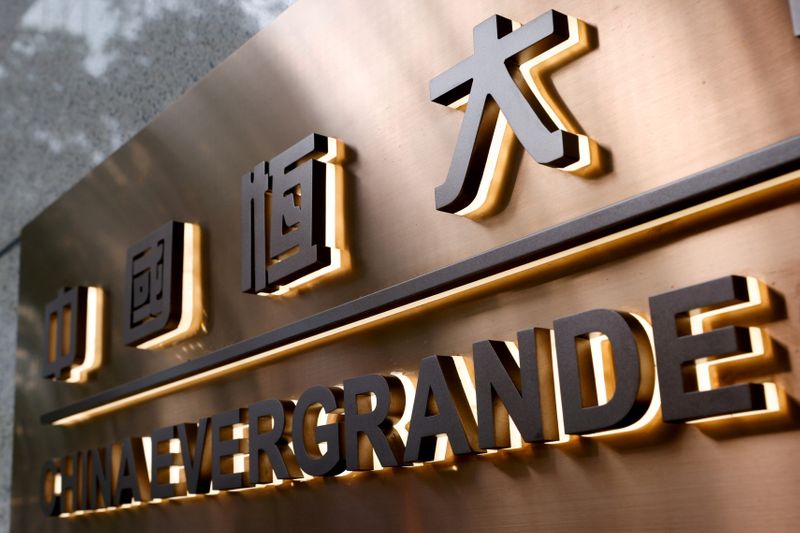By Clare Jim
HONG KONG (Reuters) -Some offshore bondholders of China Evergrande Group did not receive coupon payments by the end of a 30-day grace period, four people with knowledge of the matter said, pushing the cash-strapped property developer closer to formal default.
Failure to make $82.5 million in interest payments that were due last month would trigger cross-default on the firm's roughly $19 billion of international bonds and put the developer at risk of becoming China's biggest-ever defaulter.
WHAT IS EVERGRANDE?
Chairman Hui Ka Yan founded Evergrande in Guangzhou in 1996. It is China's second-largest property developer, with $110 billion in sales last year, $355 billion in assets and more than 1,300 developments nationwide. It listed in Hong Kong in 2009.
Evergrande grew rapidly through a loan-supported land-buying spree and selling apartments quickly at low margins. It employed 163,119 staff as of June-end, its interim report showed.
Slowing growth has seen it branch into businesses such as insurance, bottled water, soccer and electric vehicles (EVs).
HOW DID CONCERNS ARISE OVER DEBT?
In September last year, a leaked letter showed Evergrande pleading for government support to approve a now-dropped backdoor stock market listing. Sources told Reuters the letter was authentic; Evergrande called it fake.
In June, Evergrande said it did not pay some commercial paper on time, and in July a court froze a $20 million bank deposit held by the firm at the bank's request.
The firm in late August said construction at some of its developments had halted due to missed payments to contractors and suppliers. And in September, it sought payment extension for trust and bank loans.
Liabilities, including payables, totalled 1.97 trillion yuan ($306 billion) at June-end - equivalent to 2% of China's gross domestic product.
HOW HAS EVERGRANDE REDUCED DEBT?
Evergrande accelerated efforts to cut debt last year after regulators introduced caps on three debt ratios, dubbed the "three red lines". It has been aiming to meet those requirements by the end of 2022.
It offered steep discounts on residential developments to spur sales and sold the bulk of its commercial properties. Since the second half of 2020, it has had a $555 million secondary share sale and raised $1.8 billion by listing its property management unit, while its EV unit sold a $3.4 billion stake.
In September, it said asset and equity disposal plans had failed to make material progress. It has since sold new shares in the company and stakes in units such as HengTen Networks Group Ltd to raise capital.
WHAT'S THE RISK?
China's central bank said in 2018 companies including Evergrande might pose systemic risk to the financial system.
The firm's liabilities involved as many as 128 banks and over 121 non-banking institutions, the leaked letter showed.
Late repayments could trigger cross-defaults as many financial institutions are exposed via direct loans and indirect holdings through different financial instruments.
WHAT ABOUT OPERATIONS OUTSIDE MAINLAND CHINA?
In Hong Kong, Evergrande owns an office tower and residential developments, plus a vast undeveloped land parcel.
It has spent billions of dollars acquiring stakes in automobile technology developers, including Sweden's NEVS and the Netherlands' e-Traction. It also has joint ventures with Germany's Hofer and Sweden's Koenigsegg.
WHAT DO REGULATORS SAY ABOUT EVERGRANDE AND PROPERTY?
Authorities including Vice Premier Liu He, the central bank and the securities regulator have been assuring markets that risk to the property sector and economy were controllable, and that Evergrande's problems were mainly due to its "own mismanagement" and "break-neck expansion".
In coordinated statements on Friday, the People's Bank of China said short-term risk caused by a single real estate firm would not undermine market fundraising in the medium or long term, and that housing sales, land purchases and financing "have already returned to normal in China".
WHAT'S NEXT FOR EVERGRANDE?
Evergrande said on Monday it had established a risk-management committee including officials from state companies to assist in "mitigating and eliminating the future risks".
That came after the provincial government of Guangdong said it would send a team to Evergrande at the developer's request, which analysts said signalled Evergrande would begin managed debt-asset restructuring.
WHAT WILL DEBT RESTRUCTURING LOOK LIKE?

Morgan Stanley (NYSE:MS) said such a process would involve coordination between authorities to maintain operations of property projects, and negotiation with onshore creditors to ensure financing for project completion.
Regulators would also likely facilitate debt restructuring discussion with offshore creditors after operations stabilise, Morgan Stanley said.